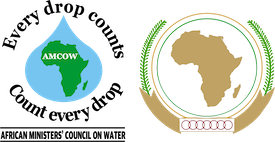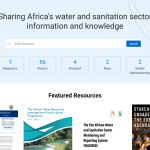As AMCOW Launches Its Knowledge Management Hub Of Hubs
Nigeria’s former Minister in charge of water resources and sanitation, and the first president of the African Ministers’ Council on Water (AMCOW), Barrister Mukhtari Shehu Shagari, CFR, has called on the United Nations (UN) to include Knowledge Management in their next development goals after 2030.
Speaking during the virtual launch of the AMCOW “Knowledge Management” platform described as the hub of hubs, on November 18, 2020, Barrister Shehu Shagari observed that information management and sharing have become so important in our world today. He recalled the day in April 2002 when he and 40 other Ministers in charge of water in Africa gathered in Abuja to establish a learning, knowledge sharing and coordination platform that gave birth to the present AMCOW. He asserted that their vision was to promote cooperation, security, socio-economic development, and poverty eradication by managing water resources and providing water supply and sanitation services. He expressed happiness that AMCOW is now an intergovernmental organization recognized as African Union’s Specialized Technical Committee (STC) on Water and Sanitation.
According to AMCOW’s Knowledge Management Strategy 2017, the Council recognises that knowledge is at the core of AMCOW’s political leadership, policy direction, and advocacy work. Also, the strategy highlights that Water and sanitation specialists across the continent look to AMCOW’s ministerial authority to develop recognition and understanding of water and sanitation as a priority cross-cutting factor in economic development. Therefore, the strategy includes knowledge platforms that demonstrate its efforts to promote the uptake and application of research results on water and sanitation challenges and to facilitate joint learning among water and sanitation researchers, planners, managers, and users.
In addition, the strategy recognises that Africa already has a lot of resources covering several water and sanitation topics. It acknowledges that using the knowledge hub is a vital strategy to connect these resources and make them accessible to sector players. This would help to facilitate capacity building for improved service delivery. AMCOW agrees that preserving the sector’s legacy for the younger generation is necessary. It believes that this dynamic system will continue to evolve to accommodate online courses, using local expertise and practices and to support the use and reuse of the sector’s new knowledge.
To bolster the importance of the hub, the Executive Secretary of AMCOW, Dr Canisius Kanangire, said that the knowledge hub forms part of AMCOW’s services to its Member States. He said it is timely, considering the new working conditions caused by the COVID-19 pandemic. He also said they believe such a virtual hub is an excellent way to facilitate collaboration and accelerate learning. He posited that the knowledge hub of hubs provides tools to help users enter through one door and have access to many other rooms to find information and knowledge. He averred that users could also gain access through direct hyperlinks to other hubs or online resource centres.
Further, he said that the hub presents a rich opportunity to harness and raise the profile of the sector’s relevant home-grown knowledge and provide students, researchers, policymakers, and development partners access to reliable data, information, and learning. These resources he went on will help to improve decisions and offer wisdom to achieve related development goals like the African Water Vision 2025 and the Agenda 2063 – “the Africa we want.”
The Centre, named after the former Minister Mukhtari Shehu Shagari Resource Centre, comprises a physical library at the AMCOW’s Secretariat and an online knowledge hub. This effort is supported by the Swedish International Development Cooperation Agency (Sida) and partly by the Water and Sanitation Collaborative Council (WSSCC). It’s in response to AU’s Heads of State and Government Sharm el-Sheikh commitment to build institutional and human resources capacity, enhance information and knowledge management, and strengthen monitoring and evaluation for sustainable and integrated water resource management. The online platform demonstrates the ability to link and converge other such portals and virtual resource centres into a one-stop centre for accessing water and sanitation information and knowledge.
Taking questions during the Question and Answer Session, the Knowledge Management and Information Sharing Officer, Mr Obinna Richfield Anah, who coordinated the development of the platform as part of his work to implement AMCOW’s Knowledge Management Strategy developed in 2017, likened the hub to Facebook where all the local, and foreign organizations working in the water, and sanitation sector in Africa will converge to brainstorm and exchange knowledge on issues affecting the sector.
The launch witnessed 109 attendees from AMCOW constituencies, Member States, the African Union, UNESCO, SIDA, WSSCC, Sustainable Sanitation Alliance, African Development Bank (AfDB), African Union Development Agency, Water Centres of Excellence (CoE), Universities and more. It also got an 85 per cent engagement in questions and comments, demonstrating a keen interest in Africans to enhance the exchange and access to information and knowledge.








